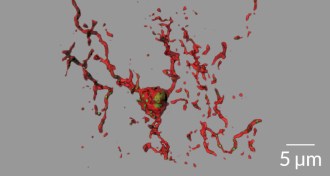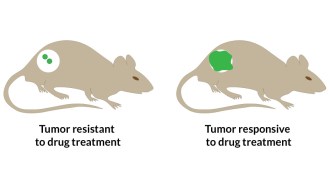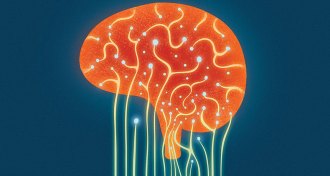Humans
Sign up for our newsletter
We summarize the week's scientific breakthroughs every Thursday.
-
 Health & Medicine
Health & MedicineMachine makes drugs on demand
A new drug-making system rapidly produces a variety of medications on demand.
-
 Health & Medicine
Health & MedicineFridge-sized contraption makes drugs on demand
A new drug-making system rapidly produces a variety of medications on demand.
-
 Neuroscience
NeuroscienceNerve cell links severed in early stages of Alzheimer’s
Nerve cell connections may be trimmed too much in early stages of Alzheimer’s.
-
 Health & Medicine
Health & MedicineEnvironment still tied to MS risk
50 years ago, scientists reported a possible connection between the environment and multiple sclerosis risk.
-
 Health & Medicine
Health & MedicineShould C-section babies get wiped down with vagina microbes?
A study suggests that a post-birth rubdown with vaginal fluid offers starter microbes to babies born by C-section. But it might not always be a good idea.
-
 Archaeology
ArchaeologyAncient Assyrians buried their dead with turtles
Why did ancient Assyrians bury their dead with turtles? The reptiles may have served as symbolic protectors of the dead.
-
 Anthropology
AnthropologyHobbits died out earlier than thought
Tiny Indonesian hominids disappeared earlier than thought, around 50,000 years ago.
By Bruce Bower -
 Health & Medicine
Health & MedicineCancer killers send signal of success
Newly designed nanoparticles deliver anticancer drugs and updates on tumor death.
-
 Genetics
GeneticsZika may have flown to Brazil in 2013
The brand of Zika currently floating around the Americas traces its origins to Asia and may have arrived in Brazil by air as early as 2013.
-
 Life
LifeRacing for answers on Zika
In the latest issue of Science News, Editor in Chief Eva Emerson talks Zika virus, microbes, nutrition and mental health.
By Eva Emerson -
 Health & Medicine
Health & MedicineMicrobes can play games with the mind
Our bodies are having a conversation with our microbiome that may be affecting our mental health — for better or worse.
-
 Neuroscience
NeuroscienceBrain holds more than one road to fear
A study on rare patients suggests that fear can take many paths through the brain.